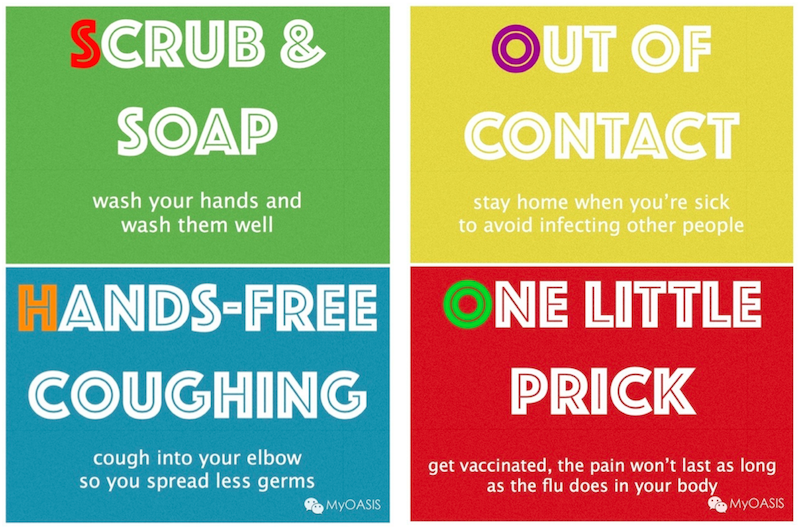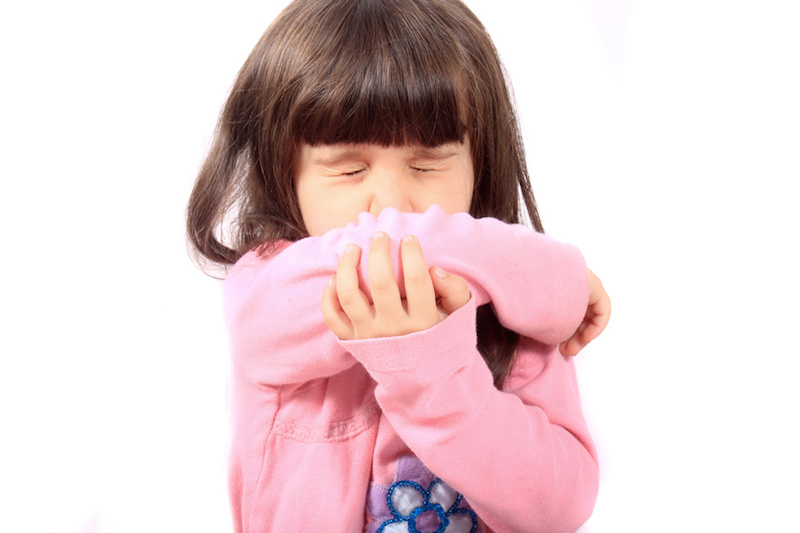The term “the flu” has been used to described just about everything from a stomach bug to a bout of food poisoning, but influenza (the actual flu) is a respiratory illness that’s got nothing to do with your gastrointestinal system.
Influenza can strike at any time, but as the seasons roll on and weather becomes increasing colder, the chances of catching it are greater. The chill in the weather causes us to retreat to the warmth of our homes and families which unfortunately, creates a nice breathing ground for the flu. Indoor ventilation and air conditioning can help spread the infection, not to mention all the surfaces you and any grubby little hands may touch.
A few hygiene Rules of the Flu go as follows:
 According to a study done at MIT, sneezes can spread germs much farther than previously believed. Air movement or air flow, such as air-conditioning, can increase the reach these germs can have. That’s bad news for spaces like offices or airplanes that share a ventilation system. A sneeze can send airborne pathogens floating in the air farther, so germs from the sick guy at the office, are very likely to reach a surface near you.
According to a study done at MIT, sneezes can spread germs much farther than previously believed. Air movement or air flow, such as air-conditioning, can increase the reach these germs can have. That’s bad news for spaces like offices or airplanes that share a ventilation system. A sneeze can send airborne pathogens floating in the air farther, so germs from the sick guy at the office, are very likely to reach a surface near you.
 The Centre of Diseases Control and Prevention (CDC) recommends sneezing or coughing into a tissue and then washing hands thoroughly. At a minimum, employees should cough into the crook of their arm at all times, in order to reduce the reach of their germs. Keeping surfaces in the workplace clean by wiping them down regularly with a clean paper towel and disinfectant, as well as providing employees with hand sanitizers at or near their work space, will also help.
The Centre of Diseases Control and Prevention (CDC) recommends sneezing or coughing into a tissue and then washing hands thoroughly. At a minimum, employees should cough into the crook of their arm at all times, in order to reduce the reach of their germs. Keeping surfaces in the workplace clean by wiping them down regularly with a clean paper towel and disinfectant, as well as providing employees with hand sanitizers at or near their work space, will also help.
So in the face your next sneeze, don’t think:
Bless You
Or
Gesundheit
Think…. “Cover”!!

Why annual Flu shots are important?
Influenza or Flu (an acute respiratory illness caused by influenza A or B viruses), is remarkable for its high rate of mutation which compromises the ability of the immune system to protect against the new yearly variants.
New vaccines are produced each year to counteract against new strains of circulating flu viruses. CDC recommends a yearly flu vaccine for everyone 6 months and older. The ideal time to get your flu shot is between October and November if possible. Flu vaccination can reduce flu illnesses, prevent flu-related hospitalizations as well as protect those at greater risk of getting seriously ill from the flu.
Defining symptoms of a Common Cold vs the Flu (Influenza)
 Who should get Vaccinated?
Who should get Vaccinated?
Highest priority
- Pregnant women
Priority (in no particular order):
- Children (6-59 months)
- Elderly
- Individuals with specific chronic medical conditions
- Healthcare workers
Seasonal flu can seriously affect all populations
Everyone >6 months
Who shouldn’t get Vaccinated?
Avoid it if you have had a serious reaction in the past. Factors that can affect vaccine suitability are:
- Age
- Health (current and past)
- Any relevant allergies (including egg)
Benefits of Flu Vaccination
The flu vaccination can:
- Keep you from getting sick
- Protect people who are at greater risk of getting seriously ill from flu
- Make your illness milder if you do get sick
- Reduce the risk of more serious flu outcomes
Possible Side Effects
Severe side effects are very rare
You may experience:
- Slight temperature
- Aching muscles
- Arm may be a bit sore (site of vaccine)
These symptoms should only last a couple of days

For more information on how to get your Vaxigrip Flu shot today (89 RMB)
Tel: 400-8762-747
Email: Guo.Wei@oasishealth.cn
No appointments necessary
Walk-ins welcome




